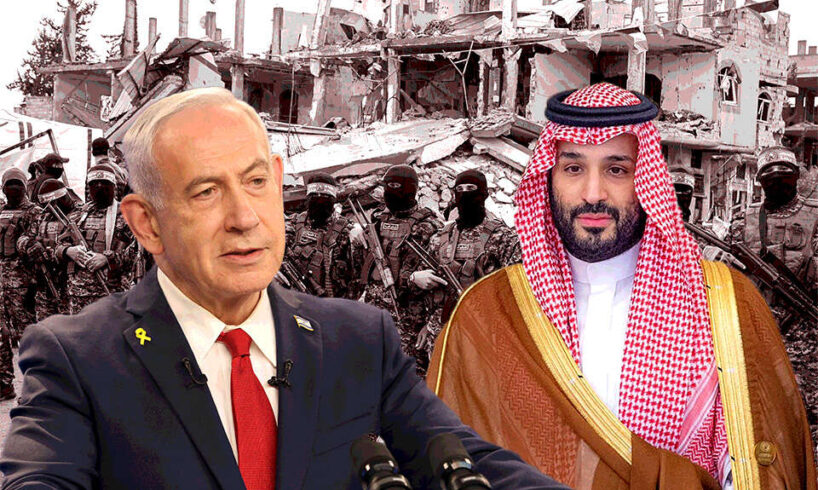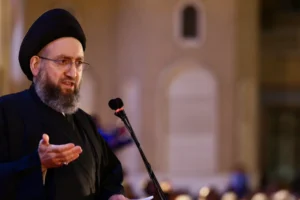
Before October 7, Saudi Arabia was on the verge of signing a normalization agreement with Israel, close to joining the Abraham Accords. Today, as the Jewish New Year approaches, the kingdom is spearheading an international initiative with France to recognize a Palestinian state, while normalization with Israel has faded into the distance. This shift is a major diplomatic achievements of Hamas and Iran.
The change in Saudi Arabia’s position has several causes, but the final trigger appears to have been Strategic Affairs Minister Ron Dermer’s call with the crown prince’s office, which took place a few weeks ago after the collapse of the Doha talks, according to American and Arab diplomatic sources.
The discussion touched on Iran following the 12-day war, Israeli-Syrian contacts, and the situation in Lebanon, but its focus was Gaza. Riyadh asked what Israel’s strategy was for ending the war and for the day after.
Strategic Affairs Minister Ron Dermer | Photo: Emil Salman
Dermer stressed that Israel was determined to defeat Hamas and ensure it could never reemerge. He dismissed proposals to discuss who would govern Gaza after the war, saying Israel opposed any role for the Palestinian Authority.
That stance was not new, but in this context, when conveyed to the most powerful Arab leader in the region, it carried extra weight. Sources said Mohammed bin Salman understood the message: Israel was not prepared for any political process with the Palestinian Authority, whether symbolic gestures toward negotiations or concrete moves toward a Palestinian state, even one demilitarized.
Sources stressed that the crown prince reiterated conditions set out in the Arab League plan and Saudi recognition initiative: demilitarization, de-radicalization and more. But the conclusion in Riyadh was that Israel was not ready to move in that direction, perhaps not even after the war.
The result has been a suspension of the Saudi proposal, which enjoys wide Arab backing, and a freeze on normalization with Israel. Dermer, who had been deeply involved in contacts with Riyadh before the war, when the two countries were already drafting joint public statements announcing normalization, has now seen those efforts stall.
An Arab diplomat told Israel Hayom that Saudi Arabia is now excluding Israel from its vision for the region’s future, which it is advancing with Washington. Ahead of President Donald Trump’s May visit to the region, Riyadh had prepared to announce a new framework with Arab states and the Palestinian Authority, later joined by France. All these initiatives, the source said, are now on hold due to what he called Prime Minister Benjamin Netanyahu’s capitulation to extremists in his government.
Dermer’s outlook was further clarified in a podcast with Donny Deutsch, in which he said that after October 7 he realized Hamas, not only Iran, posed an existential threat to Israel, and must be decisively defeated to restore deterrence. Sources said this matched the message he conveyed to the crown prince.
Hamas terrorists in the Gaza Strip. Photo: AFP AFP
In an interview with journalist Mohammad Majadle on Nas Radio in Nazareth, retired Saudi Gen. Abdullah al-Qahtani said: “Peace with Israel is off the table because Netanyahu and his government do not want peace. We presented Israel with an offer of recognition, security and reconciliation, but this extremist government is not interested in peace.” He emphasized that normalization would not occur unless an independent Palestinian state was recognized.
Al-Qahtani also criticized Qatar, saying that hosting Hamas was a mistake and that Egypt should be the sole mediator between Israel, Hamas and other Palestinian factions. His remarks reflected Riyadh’s dual stance toward Qatar: public criticism but also some satisfaction at its difficulties as host and backer of the Muslim Brotherhood.
Arab diplomatic sources said Israel’s stance could yet shift after the war, given the Trump administration’s strong interest in a regional “mega-deal,” including Gaza’s reconstruction and its transformation into a tourism hub. They noted that a more flexible Israeli approach could ease the push for international recognition of a Palestinian state. “A demilitarized Palestinian entity undergoing deep de-radicalization poses less of a threat to Israel than today’s situation with no political horizon,” one source said.
Israel is in fact engaged in practical discussions about “the day after.” Dermer himself met with senior US officials in Washington two weeks ago. Arab states, chiefly Saudi Arabia, the United Arab Emirates and Egypt, are also involved.
For now, Saudi Arabia and the UAE agree with Israel that the Palestinian Authority should not be part of Gaza’s future governing structure. All four countries also agree on the need for Palestinian de-radicalization. Israel Hayom recently revealed a plan already being implemented in humanitarian zones in southern Gaza, involving international organizations and Arab states. Under the plan, Saudi Arabia is responsible for school curricula and the UAE for introducing content on tolerance and coexistence.





